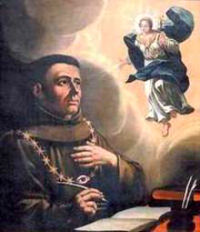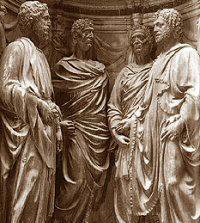1. Then drew near to him all the Publicans and sinners for to hear him.
2. And the Pharisees and Scribes murmured, saying, This man receives sinners, and eats with them.
3. And he spoke this parable to them, saying,
4. What man of you, having an hundred sheep, if he lose one of them, doth not leave the ninety and nine in the wilderness, and go after that which is lost, until he find it?
5. And when he has found it, he lays it on his shoulders, rejoicing.
6. And when he comes home, he calls together his friends and neighbors, saying to them, Rejoice with me; for I have found my sheep which was lost.
7. I say to you, that likewise joy shall be in heaven over one sinner that repents, more than over ninety and nine just persons, which need no repentance.
AMBROSE; You had learnt by what went before not to be occupied by the business of this world, not to prefer transitory things to eternal. But because the frailty of man can not keep a firm step in so slippery a world, the good Physician has shown you a remedy even after falling; the merciful Judge has not denied the hope of pardon; hence it is added, Then drew near to him all the publicans.
GLOSS. That is, those who collect or farm the public taxes, and who make a business of following after worldly gain.
THEOPHYL. For this was His wont, for the sake whereof He had taken upon Him the flesh, to receive sinners as the physician those that are sick. But the Pharisees, the really guilty, returned murmurs for this act of mercy, as it follows, And the Pharisees and Scribes murmured, saying, &c.
GREG, From which we may gather, that true justice feels compassion, false justice scorn, although the just are wont rightly to repel sinners. But there is one act proceeding from the swelling of pride, another from the zeal for discipline. For the just, though without they spare not rebukes for the sake of discipline, within cherish sweetness from charity. In their own minds they set above themselves those whom they correct, whereby they keep both them under by discipline, and themselves by humility. But, on the contrary, they who from false justice are wont to pride themselves, despise all others, and never in mercy condescend to the weak; and thinking themselves not to be sinners, are so much the worse sinners. Of such were the Pharisees, who condemning our Lord because He received sinners, with parched hearts reviled the very fountain of mercy. But because they were so sick that they knew not of their sickness, to the end that they might know what they were, the heavenly Physician answers them with mild applications. For it follows, And he spoke this parable to them, saying What man of you having a hundred sheep, and if he lose one of them, does not go after it, &c. He gave a comparison which man might recognize in himself; though it referred to the Creator of men. For since a hundred is a perfect number, He Himself had a hundred sheep, seeing that He possessed the nature of the holy angels and men. Hence he adds, Having a hundred sheep.
CYRIL; We may hence understand the extent of our Savior's kingdom. For He says there are a hundred sheep, bringing to a perfect sum the number of rational creatures subject to Him. For the number hundred is perfect, being composed of ten decades. But out of these one has wandered, namely, the race of man which inhabits earth.
AMBROSE; Rich then is that Shepherd of whom we all are a hundredth part; and hence it follows, And if he lose one of them, does he not leave &c.
GREG. One sheep then perished when man by sinning left the pastures of life. But in the wilderness the ninety and nine remained, because the number of the rational creatures, that is to say of Angels and men who were formed to see God, was lessened when man perished; and hence it follows, Does he not leave the ninety and nine in the wilderness, because in truth he left the companies of the Angels in heaven. But man then forsook heaven when he sinned. And that the whole body of the sheep might be perfectly made up again in heaven, the lost man was sought for on earth; as it follows, And go after that &c.
CYRIL; But was He then angry with the rest, and moved by kindness only to one? By no means. For they are in safety, the right hand of the Most Mighty being their defense. It behoved Him rather to pity the perishing, that the remaining number might not seem imperfect. For the one being brought back, the hundred regains its own proper form.
AUG. Or He spoke of those ninety and nine whom He left in the wilderness, signifying the proud, who bear solitude as it were in their mind, in that they wish to appear themselves alone, to whom unity is wanting for perfection. For when a man is torn from unity, it is by pride; since desiring to be his own master, he follows not that One which is God, but to that One God ordains all who are reconciled by repentance, which is obtained by humility.
GREG. NYSS.. But when the shepherd had found the sheep, he did not punish it, he did not get it to the flock by driving it, but by placing it upon his shoulder, and carrying it gently, he united it to his flock. Hence it follows, And when he has found it, he lays it upon his shoulders rejoicing.
GREG. He placed the sheep upon his shoulders, for faking man's nature upon Him he bore our sins. But having found the sheep, he returns home; for our Shepherd having restored man, returns to his heavenly kingdom. And hence it follows, And coming he collects together his friends and neighbors, saying to them, Rejoice with me, for I have found my sheep which was lost. By his friends and neighbors He means the companies of Angels, who are His friends because they are keeping His will in their own steadfastness; they are also His neighbors, because by their own constant waiting upon Him they enjoy the brightness of His sight.
THEOPHYL. The heavenly powers thus are called sheep, because every created nature as compared with God is as the beasts, but inasmuch as it is rational, they are called friends and neighbors.
GREG. And we must observe that He says not, "Rejoice with the sheep that is found," but with me, because truly our life is His joy, and when we are brought home to heaven we fill up the festivity of His joy.
AMBROSE; Now the angels, inasmuch as they are intelligent beings, do not unreasonably rejoice at the redemption of men, as it follows, I say to you, that likewise joy shall be in heaven over one sinner that repents, more than over ninety and nine just persons who need no repentance. Let this serve as an incentive to goodness, for a man to believe that his conversion will be pleasing to the assembled angels, whose favor he ought to court, or whose displeasure to fear.
GREG. But he allows there is more joy in heaven over the converted sinner, than over the just who remain steadfast; for the latter for the most part, not feeling themselves oppressed by the weight of their sins, stand indeed in the way of righteousness, but still do not anxiously sigh after the heavenly country, frequently being slow to perform good works, from their confidence in themselves that they have committed no grievous sins. But, on the other hand, sometimes those who remember certain iniquities that they have committed, being pricked to the heart, from their very grief grow inflamed towards the love of God; and because they consider they have wandered from God, make up for their former losses by the succeeding gains. Greater then is the joy in heaven, just as the leader in battle loves that soldier more who having turned from flight, bravely pursues the enemy, than him who never turned his back and never did a brave act. So the husbandman rather loves that land which after bearing thorns yields abundant fruit, than that which never had thorns, and never gave him a plentiful crop. But in the mean time we must be aware that there are v very many just men in whose life there is so much joy, that no penitence of sinners however great can in any way be preferred to them. Whence we may gather what great joy it causes to God when the just man humbly mourns, if it produces joy in heaven when the unrighteous by his repentance condemns the evil that he has done.
8. Either what woman having ten pieces of silver, if she lose one piece, does not light a candle, and sweep the house, and seek diligently till she find it?
9. And when she has found it, she calls her friends and her neighbors together, saying, Rejoice with me; for I have found the piece which I had lost.
10. Likewise, I say to you, there is joy in the presence of the angels of God over one sinner that repents.
CHRYS. By the preceding parable, in which the race of mankind was spoken of as a wandering sheep, we were shown to be the creatures of the most high God, who has made us, and not we ourselves, and we are the sheep of his pasture. But now is added a second parable, in which the race of man is compared to a piece of silver which was lost, by which he shows that we were made according to the royal likeness and image, that is to say, of the most high God. For the piece of silver is a coin having the impress of the king's image, as it is said, Or what woman having ten pieces of silver, if she lose one, &c.
GREG. He who is signified by the shepherd, is also by the woman. For it is God Himself, God and the wisdom of God, but the Lord has formed the nature of angels and men to know Him, and has created them after His likeness. The woman then had ten pieces of silver, because there are nine orders of angels, but that the number of the elect might be filled up, man the tenth was created.
AUG. Or by the nine pieces of silver, as by the ninety and nine sheep, He represents those who trusting in themselves, prefer themselves to sinners returning to salvation. For there is one wanting to nine to make it ten, and to ninety-nine to make it a hundred. To that One He ordains all who are reconciled by repentance.
GREG. And because there is an image impressed on the piece of silver, the woman lost the piece of silver when man (who was created after the image of God) by sinning departed from the likeness of his Creator. And this is what is added, y she lose one piece, does she not light a candle. The women lighted a candle because the wisdom of God appeared in man. For the candle is a light in an earthen vessel, but the light in an earthen vessel is the Godhead in the flesh. But the candle being lit, it follows, And disturbs the house. Because verily no sooner had his Divinity shone forth through the flesh, than all our consciences were appalled. Which word of disturbance differs not from that which is read in other manuscripts, sweeps, because the corrupt mind if it be not first overthrown through fear, is not cleansed from its habitual faults. But when the house is broken up, the piece of silver is found, for it follows, And seeks diligently till she find it; for truly when the conscience of man is disturbed, the likeness of the Creator is restored in man.
GREG. NAZ. But the piece of silver being found, He makes the heavenly powers partakers of the joy whom He made the ministers of His dispensation, and so it follows, And when she had found it, she calls together her friends and neighbors.
GREG. For the heavenly powers are nigh to Divine wisdom, inasmuch as they approach Him through the grace of continual vision.
THEOPHYL. Either they are friends as performing His will, but neighbors as being spiritual; or perhaps His friends are all the heavenly powers, but His neighbors those that come near to Him, as Thrones, Cherubims, and Seraphims.
GREG. NYSS.. Or else; this I suppose is what our Lord sets before us in the search after the lost piece of silver, that no advantage attaches to us from the external virtues which He calls pieces of silver, although all of them be ours, as long as that one is lacking to the widowed soul, by which in truth it obtains the brightness of the Divine image. Wherefore He first bids us light a candle, that is to say, the divine word which brings hidden things to light, or perhaps the torch of repentance. But in his own house, that is, in himself and his own conscience, must a man seer; for the lost piece of silver, that is, the royal image, which is not entirely defaced, but is hid under the dirt, which signifies its corruption of the flesh, and this being diligently wiped away, that is, washed out by a well-spent life, that which was sought for shines forth. Therefore ought she who has found it to rejoice, and to call to partake of her joy the neighbors, (that is, the companion virtues,) reason, desire, and anger, and whatever powers are observed round the soul, which she teaches to rejoice in the Lord. Then concluding the parable, He adds, There is joy in the presence of the angels over one sinner that repents.
GREG. To work repentance is to mourn over past sins, and not to commit things to be mourned over. For he who weeps over some things so as yet to commit others, still knows not how to work repentance, or is a hypocrite; he must also reflect that by so doing he satisfies not his Creator, since he who had done what was forbidden, must cut off himself even from what is lawful, and so should blame himself in the least things who remembers that he has offended in the greatest.
Catena Aurea Luke 15


 John Duns Scotus was probably born in the winter of 1266 in the South of Scotland. Around 1279 he was accepted in a Franciscan friary in South Scotland. After eight years of preliminary studies in philosophy, or rather in the artes, at Oxford, he started to study theology there in 1288. Having attained the age of 25 he was ordained a priest in Northampton on March 17th 1291.
John Duns Scotus was probably born in the winter of 1266 in the South of Scotland. Around 1279 he was accepted in a Franciscan friary in South Scotland. After eight years of preliminary studies in philosophy, or rather in the artes, at Oxford, he started to study theology there in 1288. Having attained the age of 25 he was ordained a priest in Northampton on March 17th 1291.  The history of these holy martyrs is very confusing. The Martyrology has this: "At Rome on the Via Lavicana the day of the death of four holy martyrs, the brothers Severus, Severianus, Carpophorus, and Victorinus. Under Emperor Diocletian they were scourged to death with lead rods. Their names were first made known many years later through a divine revelation. As no one knew their names previously, the annual feastday to their honor was celebrated under the title: The Four Crowned Brothers. The designation was retained even after the revelation."
The history of these holy martyrs is very confusing. The Martyrology has this: "At Rome on the Via Lavicana the day of the death of four holy martyrs, the brothers Severus, Severianus, Carpophorus, and Victorinus. Under Emperor Diocletian they were scourged to death with lead rods. Their names were first made known many years later through a divine revelation. As no one knew their names previously, the annual feastday to their honor was celebrated under the title: The Four Crowned Brothers. The designation was retained even after the revelation."